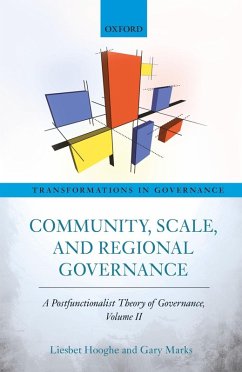This is the second of five ambitious volumes theorizing the structure of governance above and below the central state. This book is written for those interested in the character, causes, and consequences of governance within the state. The book argues that jurisdictional design is shaped by the functional pressures that arise from the logic of scale in providing public goods and by the preferences that people have regarding self-government. The first has to do with the character of the public goods provided by government: their scale economies, externalities, and informational asymmetries. The second has to do with how people conceive and construct the groups to which they feel themselves belonging. In this book, the authors demonstrate that scale and community are principles that can help explain some basic features of governance, including the growth of multiple tiers over the past six decades, how jurisdictions are designed, why governance within the state has become differentiated, and the extent to which regions exert authority. The authors propose a postfunctionalist theory which rejects the notion that form follows function, and argue that whilst functional pressures are enduring, one must engage human passions regarding self-rule to explain variation in the structures of rule over time and around the world. Transformations in Governance is a major new academic book series from Oxford University Press. It is designed to accommodate the impressive growth of research in comparative politics, international relations, public policy, federalism, environmental and urban studies concerned with the dispersion of authority from central states up to supranational institutions, down to subnational governments, and side-ways to public-private networks. It brings together work that significantly advances our understanding of the organization, causes, and consequences of multilevel and complex governance. The series is selective, containing annually a small number of books of exceptionally high quality by leading and emerging scholars. The series targets mainly single-authored or co-authored work, but it is pluralistic in terms of disciplinary specialization, research design, method, and geographical scope. Case studies as well as comparative studies, historical as well as contemporary studies, and studies with a national, regional, or international focus are all central to its aims. Authors use qualitative, quantitative, formal modeling, or mixed methods. A trade mark of the books is that they combine scholarly rigour with readable prose and an attractive production style. The series is edited by Liesbet Hooghe and Gary Marks of the University of North Carolina, Chapel Hill, and the VU Amsterdam, and Walter Mattli of the University of Oxford.
Dieser Download kann aus rechtlichen Gründen nur mit Rechnungsadresse in A, B, BG, CY, CZ, D, DK, EW, E, FIN, F, GR, HR, H, IRL, I, LT, L, LR, M, NL, PL, P, R, S, SLO, SK ausgeliefert werden.









